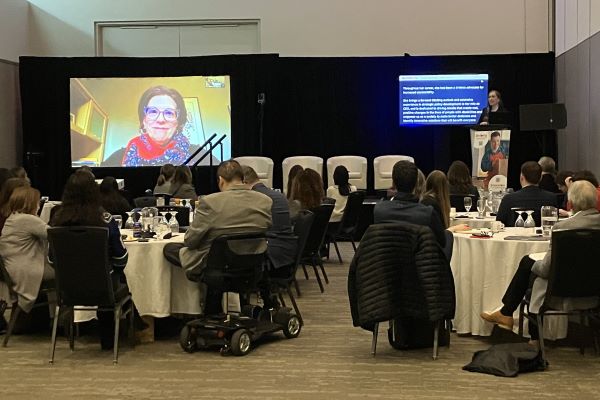“Try things, fail forward. What matters is that you stay open to learning and improving, and that the efforts that you’re making are done with an open heart.”
Stephanie Cadieux, Canada’s first Chief Accessibility Officer, shared inspiring words, lived experiences, and real-world advice at Tourism HR Canada’s first event under the Belong initiative, Embracing Disability Inclusion in Tourism Workplaces.
About 60 tourism stakeholders gathered in Ottawa to share ideas, insights, and experiences around IDEAL workplaces: inclusive, diverse, equitable, accessible, and leading.
Providing the keynote address, Stephanie talked about the Accessible Canada Act and the learning journey underway. She stressed how important it is to ask questions and not be afraid to make mistakes—it’s about shifting the thought process, and while it won’t happen overnight, there is a path to getting there.
“Society has for so long allowed people with disabilities to be “other”, an afterthought, and for people with disabilities to overcome the barriers we put in front of them,” she stated. “The Act is really asking for a fundamental shift in our societal values. Each and every one of us that starts to bring these things to the conversation starts to make accessibility a piece of the conversation—every time we see a problem and we raise it, that allyship will start to drive that change.”
Stephanie cited the latest numbers: about 850,000 people with disabilities in Canada are ready, willing, and able to work, and 50% of those will have a university or college diploma.
“People with disabilities are 27% of Canada’s population, and many identify employment as their top priority,” she noted. “They are the biggest untapped talent pool we have in Canada, and far too much potential is being lost because we are preventing them from contributing to their fullest, because we’re continuing to erect barriers to their inclusion—like a lack of transportation options or hiring processes and practices that exclude them.”
She spoke to the challenge of travellers finding information about accessibility, the small percentage of truly accessible tourism facilities, and the resulting lost business, noting that hiring individuals with disabilities offers in-house expertise on what’s working and what isn’t, and how to make policies, programs, and services more accessible, because they bring lived experience with them.
Stephanie suggested employers ask the following questions before embarking on recruiting people with disabilities:
- Do I know what barriers exist in our organization?
- Do we know if our job ads are accessible?
- What about our hiring platforms?
- What about our interview processes and practices?
- How do we make them accessible?
- Do we have a process for getting workplace adjustments in place quickly upon hiring?
- What biases am I holding? (“We all have them, including people with disabilities,” she added.)
- What assumptions am I making about what roles people with disabilities can occupy? What about certain types of disabilities?
- Am I making assumptions about people’s capacity and capability based on their disability, or am I open to letting them demonstrate to me how they accomplish tasks?
- Am I using the right language—am I saying “duty to accommodate”, like it’s an obligation or a burden, or am I asking, “What do we have to do to help you thrive here and contribute to your fullest?”
“As you undertake hiring initiatives, it’ll be important to ensure that your culture and your workplace is ready and that the appropriate training is in place for all of your employees,” she continued. “Because if work cultures are not accepting and understanding, then people with disabilities won’t have a good experience when they come in and they won’t stay.”
She encouraged attendees to review her recently published report, Everyone’s Business: Accessibility in Canada, for further insights on the current state of affairs in Canada and key areas where more action is needed.
She wrapped up by noting, “I know that this work matters to you because you’re in the room, and that with Belong, Tourism HR Canada is going to help tourism operators innovate and create more accessible and inclusive travel experiences, as well as more meaningful jobs. It’s really important work and it will help to influence a broader change in society by demonstrating what is possible. I really look forward to seeing what you do, and I encourage you to keep it up.”
Watch for highlights from the panel discussion featuring leaders in DEI to be published soon.

